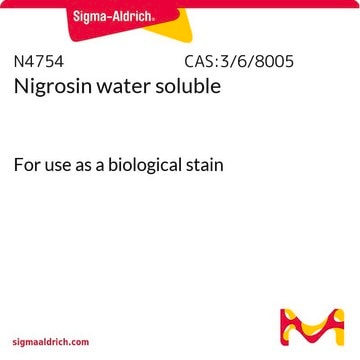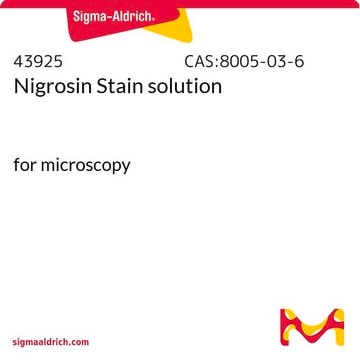N4763
Nigrosin water soluble
powder, BioReagent, suitable for cell culture
Synonym(s):
Acid black 2
Sign Into View Organizational & Contract Pricing
All Photos(1)
About This Item
CAS Number:
Colour Index Number:
50420
MDL number:
UNSPSC Code:
12352207
NACRES:
NA.75
Recommended Products
product line
BioReagent
form
powder
technique(s)
cell culture | mammalian: suitable
solubility
H2O: 10 mg/mL
Looking for similar products? Visit Product Comparison Guide
General description
Nigrosin is an acidic dye, useful for negative staining, in which only the background is stained.
Application
Nigrosin water soluble has been used to stain live sperm.
Used as a viable cell staining agent especially in stem cell biology.
Storage Class Code
13 - Non Combustible Solids
WGK
WGK 3
Flash Point(F)
Not applicable
Flash Point(C)
Not applicable
Certificates of Analysis (COA)
Search for Certificates of Analysis (COA) by entering the products Lot/Batch Number. Lot and Batch Numbers can be found on a product’s label following the words ‘Lot’ or ‘Batch’.
Already Own This Product?
Find documentation for the products that you have recently purchased in the Document Library.
Customers Also Viewed
Effect of two protocols of cryopreservation on fertilizing capacity of stallion (Equus caballus) semen
Restrepo BG, et al.
Revista Facultad Nacional de Agronomia (Medellin, Colombia), 65(2), 6711-6718 (2012)
Biotechnology-II: Including Cell Biology, Genetics, Microbiology (2007)
Association of chromosomal aberrations and semen quality in egyptian buffalo bulls
Rushdi HE, et al.
Egyptian journal of animal production, 54(2), 95-103 (2017)
Lukas Schertel et al.
Journal of the Royal Society, Interface, 17(166), 20200196-20200196 (2020-05-21)
Vivid colours found in living organisms are often the result of scattering from hierarchical nanostructures, where the interplay between order and disorder in their packing defines visual appearance. In the case of Flavobacterium IR1, the complex arrangement of the cells
Jesse Schallek et al.
Investigative ophthalmology & visual science, 52(3), 1325-1335 (2010-11-06)
To examine the extent to which neurovascular coupling contributes to stimulus-evoked intrinsic signals in the retina. The retinas of five adult cats were examined in vivo. Animals were anesthetized and paralyzed for imaging stability. The retinas were imaged through a
Our team of scientists has experience in all areas of research including Life Science, Material Science, Chemical Synthesis, Chromatography, Analytical and many others.
Contact Technical Service











